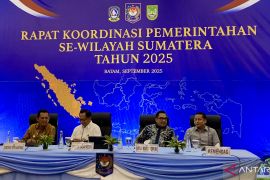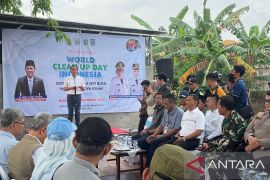International law professor of the University of Indonesia (UI) Hikmahanto Juwana considered that the payment of the diyat was a bad precedent for the forthcoming government. No matter who will lead the country, it will face a dilemmatic position.Jakarta (ANTARA News) - Convicted Indonesian migrant worker Satinah, facing beheading for murder in Saudi Arabia, was finally freed from the death penalty after the Indonesian government and the victims family agreed upon a 7 million Riyal diyat payment.
"We assure that Satinah can be freed from the beheading punishment because we have transferred another two million Riyal to the victims family. They can disburse the money as of Sunday because banks are closed in Saudi Arabia on Friday and Saturday," Gatot Abdullah Mansyur of the National Agency for Placement and Protection of Indonesian Workers Overseas (BNP2TKI) stated in Jakarta on Thursday.
Earlier the government and the victims family agreed to a payment in diyat (blood compensation money) of 7 million Riyal, of which five million was paid in cash and the remaining two million Riyal was to be paid in installments.
Satinah, 40, who hails from Semarang, Central Java, was found guilty by the Saudi Arabian court of killing her employer 70-year old Nura al-Gharib in the Gaseem area in early 2009 and of stealing her employers money amounting to 37.9 thousand Riyals.
She was initially punished with absolute death penalty. But the appellate court reduced her sentence to the Qishash death penalty, a death punishment that could be avoided by paying diyat or blood compensation money with amounts decided by the victims family.
Satinah has been jailed since 2009 and was scheduled to be executed on April 3, unless the requested diyat of 7.5 million Riyal, which is equal to about Rp21 billion, is paid.
Gatot Abdullah Mansyur clarified that the diyat was not paid in installments but in cash, where two million Riyals have been transferred from Indonesia to the victims family and five million others have been handed over through the Indonesian Embassy in Riyadh.
Of the 7 million Riyals, three million has been paid by the government of Indonesia and the other four million by donors who sympathized with Satinah.
According to Coordinating Minister for Political, Legal and Security Affairs Djoko Suyanto, the government will only provide three million riyals, while the other four million riyals was to be collected through donations from business people and other citizens of Indonesia.
Satinahs fate has triggered the governments and public concerns and solidarity movement. Indonesian rock artist Melanie Subono, for instance, had appealed to the public to donate money for the diyat payment. The Indonesian government itself had set aside 3 million Riyals to help pay for the compensation money.
Non-governmental organization Migrant Care positively welcomed the settlement deal between Indonesian government and the victims family on the compensation to free Satinah.
"This is what we have been fighting for in the past few months. This is what we expect from the government, to help pay the compensation money (diyat) to the family of the victim and free Satinah from death penalty," Executive Director of Migrant Care Anis Hidayah stated here on Thursday.
Commission for Missing People and Victims of Violence (Kontras) pointed out that Satinah is basically a victim of social injustices because she received inadequate protection. "Satinah is a victim of injustices. We are convinced that such a death penalty is a form of injustice towards vulnerable groups of people like Indonesian migrant workers," Coordinator of the Working Body of Kontras Haris Azhar declared at a press statement on Thursday.
He explained that Satinah and other Indonesian migrant workers were placed in a very vulnerable working area without proper protection. They work under a constant threat of domestic violence without proper legal protection and are far from their families.
"It happens very often that violations against workers take place often but no adequate information is available on the violence. On the other hand, it is very easy for the Indonesian migrant workers to be punished when they commit violence without proper legal assistance. The Indonesian migrant workers are always in a weak position both when they become the victims and the accused of violence," Haris stressed.
In the meantime, international law professor of the University of Indonesia (UI) Hikmahanto Juwana criticized the government for paying diyat for the victim, saying that it placed a bad precedent for the forthcoming government.
The future government will thereby face dilemmatic situationsin the face of any death penalty for Indonesian migrant workers. "It must be understood that diyat is money that must be paid by a convict or his/her family and not the government," emphasized Professor Hikmahanto Yuwana.
"The condition is certainly not good. The government could, in the future, be squeezed. The government from any country, whose citizen is involved in a murder in Saudi Arabia, can also be affected. They could also be squeezed," he asserted, adding that if they did not meet the demand like Indonesia did, their public could protest.
Professor Hikmahanto further explained that it would be unfair to the people of Indonesia if public money was used to pay for the diyat. If later, the total diyat becomes larger, and each time, the government is forced to meet it, that could threaten citizens welfare, he protested.
"One must remember that more than 30 people are currently facing execution. If all their victims demand large diyat, then that could threaten our national budget," he pointed out.
Thats why Himahanto considered that the payment of the diyat was a bad precedent for the forthcoming government. No matter who will lead the country, it will face a dilemmatic position.
"If the future government rejects a diyat payment, it will leave an impression that its performance is bad as compared to the performance of the President Susilo Bambang Yudhoyono government," he noted.
Hikmahanto is of the view that the amount of diyat paid to free Satinah was illogical and was allegedly a result of the involvement of the mafia. "Should the following government pay a diyat, how much should it pay and how much should the victims family ask for, if the payment for Satinahs diyat has reached four times the amount of diyat paid for Darsems compensation in 2011?" Hikmahanto questioned.
He suspected that the government actually knew about the mafia involvement in the case as revealed by Coordinating Minister for Political, Legal and Security Affairs Djoko Suyanto.
"But the government chooses to ignore this because it is willing to save the life of Satinah. The question is whether it is really about saving life of Satinah? Or are there other reasons in the current year of politics when a legislative election is scheduled? Is this effort made to increase the electability of the ruling party? All answers lie with the decision makers," he declared.(*)
Reporter: Andi Abdussalam
Editor: Heru Purwanto
Copyright © ANTARA 2014











